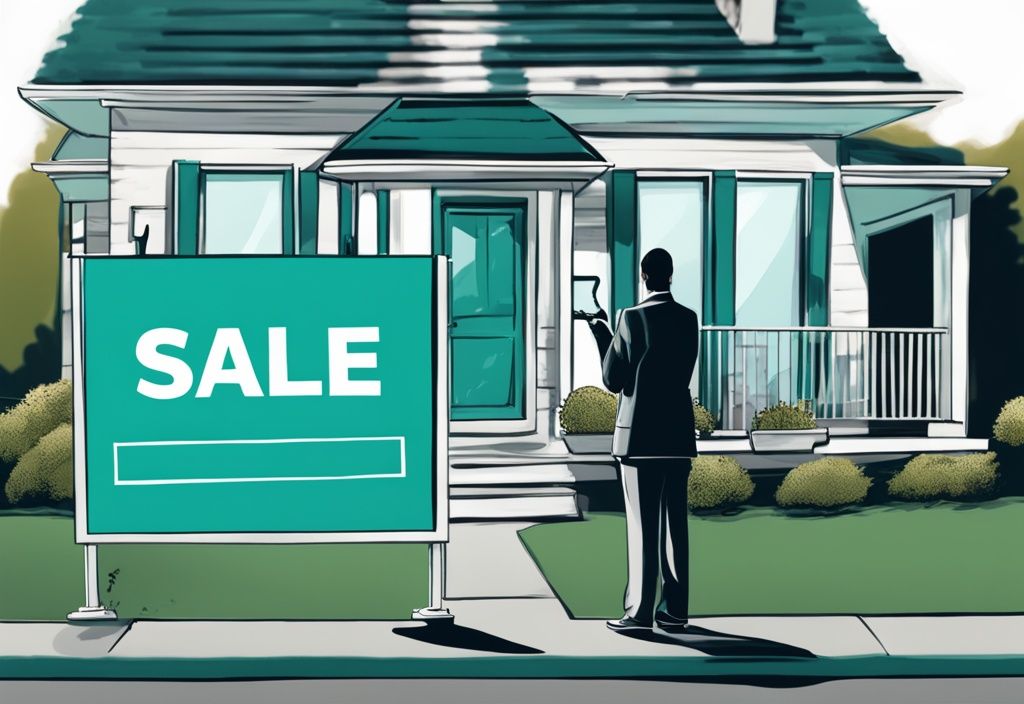Ever heard of blind ads in real estate and puzzled over what they mean? You’re not alone. It’s an enigma wrapped within the complexities of property jargon. Even seasoned real estate pros can find themselves scratching their heads, attempting to decode the purpose of these mysterious advertisements.
But don’t fret! I’m here to unravel it all for you. In this piece, I’ll give you a clear rundown on what these real estate blind ads are, how they operate and why they’re getting so popular. I’ll also shed some light on the legalities that you should keep your radar on.
So, ready to be enlightened? Buckle up and join me as we dive deep into illuminating the shadowy corners of blind ads in real estate.
The Concept of Blind Ads
A blind ad in real estate is an intriguing type of advertisement that aims to pique your interest without immediately revealing the advertiser’s identity or license status. Imagine seeing a captivating property listing, but with just enough details to spark your curiosity, yet leaving out key information like the name or contact details of the seller or real estate agent.
These ads often purposely exclude the identity of the involved parties, offering only minimal contact info such as a phone number, email address, or a physical location for inquiries. This approach generates a sense of mystery, encouraging you to reach out for more information to discover what’s behind the ad.
Blind ads are expertly crafted to catch the eye of potential buyers or renters. The main goal here is to draw you in, making you want to learn more about the property and leading you to contact the advertiser. By doing so, these ads help filter out casual inquiries, ensuring only serious prospects get through.
Why are Blind Ads Used in Real Estate?
Preserving Privacy and Confidentiality
A blind ad in real estate serves a crucial role in maintaining the privacy and confidentiality of the advertiser or seller. By leaving out specific personal details, these ads protect sensitive information from prying eyes. Imagine wanting to sell your home but not ready to share all the details upfront. Blind ads allow property owners and real estate agents to keep their identity private until they connect with genuinely interested buyers or tenants.
This strategy ensures that inquiries come from serious parties, filtering out casual browsers or those just curious. For sellers and agents, blind ads streamline the pre-screening process, making marketing efforts more efficient. Over time, this method builds trust, as the individuals reaching out are likely already serious about the property. Essentially, blind ads function as a selective filter that maintains privacy while attracting more committed and serious inquiries.
Creating Curiosity and Generating Leads
What is a blind ad in real estate without its knack for sparking curiosity and generating interest? By intentionally withholding details like the property’s exact location or the agent’s contact information, blind ads create a sense of mystery. This intrigue can be incredibly compelling, motivating potential buyers or renters to reach out and learn more, thus generating valuable leads.
These ads use persuasive language to enhance their appeal without giving too much away. This tactic gives potential clients the feeling of getting exclusive access to information, making them more eager to act quickly. The urgency created by the lack of complete disclosure often results in faster and more frequent inquiries, helping agents determine interest and seriousness without initially revealing sensitive information.
By blending curiosity with a controlled flow of information, blind ads enable real estate professionals to strategically manage client engagement and maintain a level of confidentiality that is crucial in high-stakes transactions.
Together, these strategies explain why blind ads are a popular tool in real estate, effectively balancing privacy, curiosity, and lead generation.

Legal Aspects of Blind Ads
Understanding the legal aspects surrounding blind ads in real estate is crucial for any broker or agent. Let’s break down the key components so that compliance becomes second nature and trust remains intact.
Regulations Across States
Recognizing what a blind ad in real estate entails begins with understanding the varied legal requirements across different states, including regulations aimed at providing clearer disclosures for internet advertising, which can be found on the New York Department of State’s website. Real estate brokers and agents are required to disclose their professional identity in all advertisements to ensure transparency. This means revealing their license status to avoid misleading the public. In many states, failing to provide this information in a blind ad is illegal. Given that advertising rules can widely differ, it’s essential for real estate agents to familiarize themselves with their specific state laws. This vigilance helps prevent any potential legal issues and keeps operations running smoothly.
Respecting Fiduciary Duties
Fiduciary duties are the cornerstone of the trust-based relationship between real estate agents and their clients. When using blind ads, there’s a significant risk of violating these duties. Trust, transparency, and honesty form the bedrock of any fiduciary relationship. A blind ad lacking proper disclosure can undermine this trust, resulting in misunderstandings and conflicts. Ensuring full transparency in all advertisements not only aligns with legal obligations but also fosters a trustworthy and genuine relationship with clients.
Consequences of Non-Compliance
Failing to adhere to the regulations governing what is a blind ad in real estate can lead to serious consequences. Undisclosed information in a blind ad can land the agent in legal hot water, potentially leading to lawsuits, hefty fines, and even the revocation of their real estate license. Real estate professionals must craft their advertisements with precision and compliance in mind, safeguarding their professional integrity and their ability to operate seamlessly within the industry. This proactive approach preserves their reputation and ensures they avoid unnecessary penalties.
Creating Effective Blind Ads
Unveiling the secrets of crafting captivating blind ads in real estate is all about a delicate balance between intrigue and clarity. A well-crafted blind ad draws in potential buyers or tenants by sparking their curiosity while strategically withholding key details.
Balancing Mystery and Information
Crafting a blind ad in real estate involves finding that sweet spot between sparking curiosity and maintaining mystery. The goal is to entice potential buyers or tenants to inquire further. Here are some strategies to achieve this balance:
- Highlight Key Features: Shine a light on the property’s standout elements, like the number of bedrooms, bathrooms, overall size, and condition. Mention nearby amenities such as schools, parks, and shopping centers to add value without revealing too much.
- Maintain Mystery: Keep pivotal information, such as the exact address or the owner’s identity, under wraps. Terms like “centrally located” or “luxury features” can pique interest without giving away specifics.
- Avoid Over-Promising: While it’s tempting to use superlatives, be cautious not to exaggerate. Over-promising can lead to disappointment when potential buyers see the property. Opt for honest, engaging language that sets realistic expectations.
Ensuring Ethical Advertising
Maintaining ethical standards when creating blind ads is crucial for building trust and complying with legal requirements. Here’s how to keep your advertising on the up and up:
- Legal Compliance: Follow advertising standards, such as including the advertiser’s identity and license status where necessary. This transparency helps avoid legal troubles and adds credibility to your ad.
- Clear and Honest Descriptions: Share truthful information about essential property aspects. For further insights, consider reading some of the 10 best real estate books to enhance your understanding of the market.
Avoid misleading statements or omitting significant details that could mislead potential buyers or tenants.

By emphasizing honesty and ethical standards while artfully balancing the information revealed, blind ads can effectively engage and draw serious inquiries, turning curious leads into valuable opportunities.
Pros and Cons of Blind Ads
The Upside
Blind ads can be quite the unique marketing tool in real estate. One big plus is that they let potential clients dip their toes in the water without feeling the pressure to share personal details right off the bat. When you don’t have to give out your contact info immediately, it makes reaching out a more comfortable experience, often resulting in more genuine interest.
Another neat aspect of blind ads is their ability to draw in a diverse crowd. By keeping some details under wraps, these ads tap into the natural curiosity of a wide audience. Plus, blind ads give you control over the flow of information. By initially revealing just what’s necessary, you can better manage who gets more details and when. This means you’re more likely to deal with serious inquiries only, making the whole selling process smoother and more efficient.
In hot real estate markets, a little intrigue can go a long way. Blind ads create a buzz and a sense of exclusivity around a property by holding back specific details. This tactic often leads to quicker engagement and can even speed up sales as interested buyers actively seek more information.
The Downside
But of course, blind ads have their drawbacks. For some, the lack of specific information can be a turn-off. If essential details like the property’s exact location or the seller’s contact info are missing, it can be hard for buyers to decide if the property is right for them. There’s also the risk of confusion or even mistrust. To better understand the importance of accurate information, buyers might be interested in learning what ratification in real estate means. When the initial information is scant, buyers might get the wrong impression about a property’s features, leading to disappointment and a potential loss of trust in the seller or agent. Moreover, not everyone likes playing detective. For those interested in understanding more detailed aspects of real estate, such as conversion vs. commingling, it’s beneficial to have clear and concise information upfront. Some folks prefer transparency and upfront details in their property hunts. They want to make informed decisions without feeling like they need to dig for basic information. This group might just skip over blind ads altogether in favor of listings that are straightforward and clear.
Understanding these pros and cons allows real estate pros to use blind ads wisely. The trick is to find a balance—tease just enough to generate interest while providing enough information to keep that trust and curiosity alive. That way, you get the benefits without the headaches.
Examples and Case Studies of Blind Ads
Let’s delve into how blind ads are effectively used in real estate. We’ll look at some success stories as well as lessons learned from failures.
Success Stories
What is a blind ad in real estate? Picture this: A high-end property listed using a blind ad strategy comes with generic yet enticing descriptions, void of identifying details. Imagine reading about “luxurious amenities” and “prime location” without knowing the exact address or the agent behind the ad. This approach spikes curiosity, leading to multiple serious inquiries in just a few days. By crafting a sense of exclusivity, the blind ad attracts genuinely interested buyers, paving the way for a quick sale.
In another case, blind ads were smartly utilized to sell luxury homes. These ads offered captivating hints such as “stunning architecture,” “panoramic views,” and “high-end finishes” while withholding specific addresses or agent details. The mystery created a buzz that made potential buyers reach out, eager for more information. This clever approach not only attracted numerous serious buyers but also resulted in swift, high-value transactions.

Lessons from Failures
While the idea of what is a blind ad in real estate can be quite effective, it’s crucial to strike a balance. Over-promising can be a pitfall. In one instance, an ad boasted “expansive living spaces” and “elite neighborhood living,” only to deliver less than luxurious reality upon inspection. This mismatch led to disappointment and mistrust among potential buyers, ultimately harming the agent’s reputation.
Another misstep in using blind ads was when an ad was too vague. Terms like “charming home, must-see!” were used without mentioning vital details such as the number of bedrooms or property style. This left potential buyers frustrated due to insufficient information, reducing inquiries and often disinterest from those who did follow up. This example underscores the need for a balance between generating curiosity and providing essential information, emphasizing that while curiosity can engage leads, too little detail can deter serious buyers.
FAQs
Are Blind Ads Legal?
Blind ads can be a bit of a grey area. In certain cases, they may be illegal if the ad fails to disclose necessary details like the advertiser’s identity and license status. However, if you’re a property owner who’s not a licensed real estate professional, using a blind ad is generally legal. That said, it’s crucial to double-check your specific state’s regulations to make sure you’re fully compliant.
Avoiding the Blind Ad Label
If you want to steer clear of being labeled a “blind ad” in real estate, there are a few key pieces of information you need to include. Always mention the brokerage’s name, your full name, your license status, and contact information within the ad. Simply putting a phone number or an address without these details won’t cut it. Transparency is your best friend here, so make sure you include everything needed to avoid misleading potential clients.
Can Property Owners Use Blind Ads?
Absolutely, property owners who aren’t licensed real estate agents can use blind ads legally. This is a great option for private sellers who want to keep their privacy while still drumming up interest in their property. However, it’s important to follow ethical and transparency guidelines to ensure you’re not misleading potential buyers. Being upfront goes a long way.
Conclusion
Blind ads can be a nifty marketing tool in real estate when used ethically and legally. By getting a firm grasp on what is a blind ad in real estate, you can tap into its benefits to connect with a broader audience while keeping privacy intact. These types of ads do wonders in piquing curiosity, often leading to valuable inquiries from genuinely interested individuals.
However, it’s essential to strike a balance. While the mystery of a blind ad is intriguing, providing enough property details is crucial to maintain transparency and build trust. You don’t want to fall foul of the law, so adhering to advertising standards is a must to avoid any legal snags and to uphold your fiduciary duties to clients.
When used thoughtfully, blind ads can really boost your lead generation, paving the way for successful property deals. Think of it as adding a layer of intrigue that, when combined with the right information, leads to immensely satisfying results.
Hi, I’m Alex Harper, a real estate expert with over ten years of experience in property management and legal advice. My passion is making the often complicated world of real estate understandable. I share practical tips and simple solutions to help you make better decisions – whether you’re buying a home, renting or just want to learn more about the industry. With my knowledge and experience, I want you to feel well-informed and confident in your real estate projects. Let’s tackle this together!




